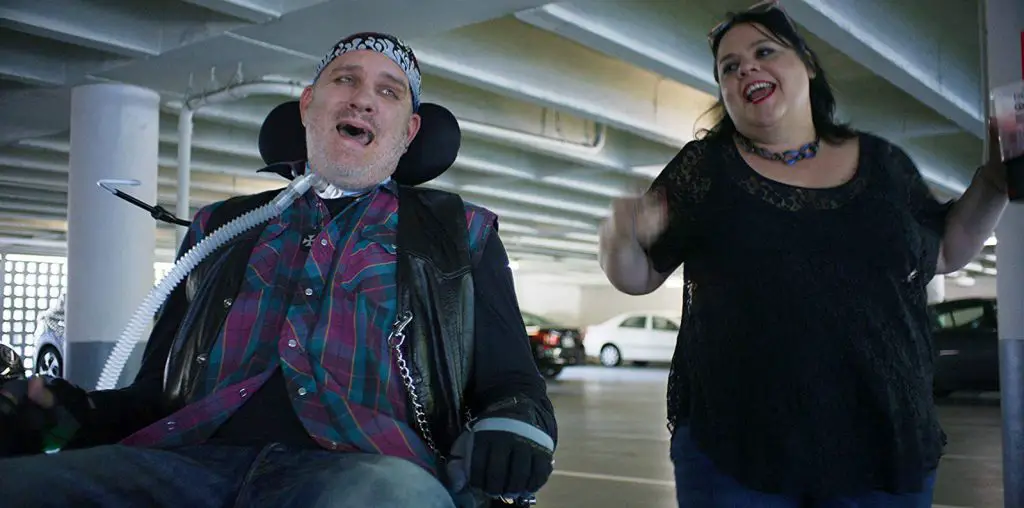
The workplace comedy genre that has spawned such works as Mike Judge’s beloved Office Space, the acclaimed BBC series “The Office,” and the considerably less acclaimed Fred Savage series “Working” now brings us the loose, episodic indie “Late Watch.” The kind of story that could only be culled from personal experiences, the script follows aspiring novelist Travis (the sleepy-eyed Stephen Daniels, who is also credited as an executive producer) on his first shift as a night watchman. Travis thinks the quiet job will give him an opportunity to work on his writing, but navigating the motley collection of eccentric coworkers proves to take up most of his time.
He meets his golf-loving boss, Martinez (played by the substantial Al Ramos), who can’t get Travis’s name right, but warns him, “We’re not looking to put a bull in a china shop, if you know what I mean.” Not that there’s much china to knock around; it turns out that, save for Travis and his coworkers, the factory and grounds the security company has been hired to guard are more or less empty. It’s a ludicrous enough concept to start off with, but under writer Michael Schur and novice director Henry Miller (also credited as co-writer), most of the humor comes not from the workplace, but from the workers.
Once taken aboard, Travis heads for uniform storage where a crass, foul-mouthed dwarf named Herve (Ethan Crough, in a role undoubtedly named in homage to late “Fantasy Island” actor Hervé Villechaize) tells him to drop his pants, before explaining, “Not here, in the back!” The tattooed, pierced Otto (Robin Goldsmith) then takes Travis on a tour of the grounds as he arranges drug deals with his coworkers. Also tucked into corners watching over empty hallways are assorted full-timers like armchair philosopher Thompson (Charles Tucker), who explains to Travis, “See, you have heaven and you have hell, and somehow we got stuck in the middle,” and the high-strung Marcozzi (Guy Camilleri), who curses out the coffee vending machine for stealing his quarters and ruminates on sneaking a firearm into work. “You ever notice they don’t have metal detectors on the way in?” Marcozzi asks.
Instead of allowing the little (and big) absurdities of bottom-of-the-ladder grunge work to present themselves, as “Office Space” did, “Late Watch” seems to shout, “Look! Isn’t this wacky?” It takes unnecessary pains to draw attention to how ridiculous its premise is, instead of just letting the story speak for itself. Travis wonders aloud why a battalion of security guards is needed to defend an empty warehouse that is already watched over by dozens of security cameras, and one coworker explains to him that the building is involved in a legal dispute and that the two parties claiming ownership would rather bury the other in paperwork than give up his claim.
Not that that background is important in any way. In fact, Schur’s mixed bag of mostly unrelated sketches works best when studiously avoiding such issues as plot or exposition. Schur should have been more sure of his choice to cram scenes together in an amorphous mass, much like the rhythms of shift changes and arbitrary perimeter sweeps his characters undergo nightly. Fledgling helmer Miller does a good enough job of conveying the hour-by-hour, sketch-by-sketch tempo, but betrays his rookie status by giving his actors blocking motivated by little more than the camera’s position.
Many of the actors, likewise, let their inexperience show. Of the entire ensemble, only two truly stand out from the crowd: Marshal (Elliot Kennerson, who could be Breckin Meyer’s long-lost twin), a mop-topped schlub whose meth-freak girlfriend tells him not to come home until her lover leaves for work, and McFeely (Gary Ray, a face from the 1980s NYC music scene), a bespectacled lifer well past middle age who still lives with his parents. Besides these two, few of the green cast are seasoned enough to make Schur’s overwritten (though often entertaining) dialogue roll trippingly off the tongue.
Schur and Miller also would have done well to condense their unwieldy cast of sketchily drawn oddballs into fewer, more well-rounded characters, and to remove a few superfluous scenes that are neither funny nor plot-related. There’s enough good material here to hash together a bang-up short film, but the writing team makes a weak attempt at stretching a dramatic storyline around one employee’s scheme to injure himself on the job, thus earning worker’s comp and a paid vacation. “If a broken arm means margaritas in Mexico,” he says, “I’m down.”
The plan, of course, fails miserably, but even worse is that Miller didn’t seem to have any idea how to stage the chaotic climax. The result is a confusing conclusion to what could have been an uproarious film. Schur deserves credit for compiling so many snatches of peculiar real-life dialogue and hammering it into a decent framework, and many of the actors flesh out their characters with enough idiosyncrasies to almost cover for their self-conscious performances. But in a comedy such as this, the laugh meter is the ultimate gauge of quality, and though it provides enough funny bits to keep you more entertained than the sad sacks that populate the film, “Late Watch” is nothing to stay up for.

If you have anyway of guiding me towards a copy of this film, it would be very much appreciated. Thank you.